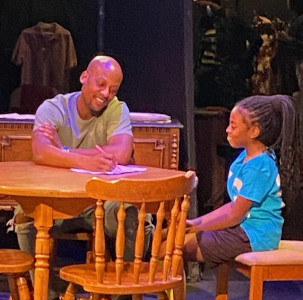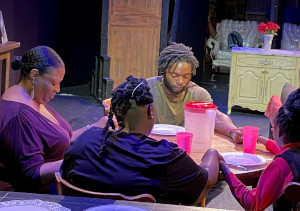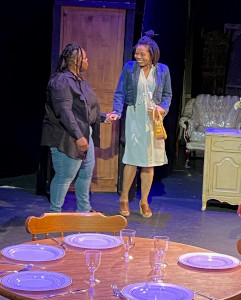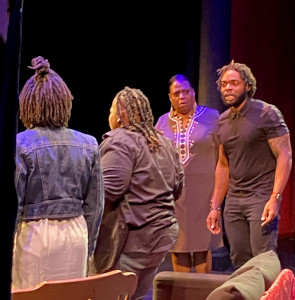
Beate
Hein Bennett
“It
Was Never Easy…”
I think it was Chekhov who commented that most tragedies happen around dinner tables. Black families are no exception. It is here that sibling resentments can fester, sudden revelations happen, and explosions rend a family apart. In "Forbidden Fruit," Ava Jenkins composed a compact series of scenes that build towards just such a situation. In the efficient direction of Fulton C. Hodges the scenes move fluidly towards the inexorable end while allowing the actors to develop their characters fully with bold strokes. The lighting, augmented with ultraviolet gels, gave the scenes a somewhat surreal pink sheen that picked up the predominant color red of the women’s costumes, and seemed to be an ironic counterpoint to the increasingly hot emotionality simmering underneath.
The family consists of Mama, a widow and formidable head of the family, is played by Suzanne Darrell as a generous and kind woman. Her eldest son Tony, played with cool kind authority by Aaron Watkins, works as an orderly in a hospital geriatric ward--he has taken on the role of the responsible male in the family. His daughter TJ is played by adorable Mel’Lahnee Blackwell with all the smart-alecky verve of a bright little ten-year old. The younger son Paul, played by Brian Anthony Simmons as an explosive and mercurial young man seems to be floundering and slipping deeper into the drug scene. Alex, the youngest sibling, played by Jade Mason as a complex young woman of uncertain gender with lesbian inclinations, is profoundly unhappy in her own skin; she works in the in the pediatric ward of the same hospital as Tony.
Three other characters, outside the family, function as catalysts that bring the family to its tragic demise. Two of them, Daryl and his older brother Prince, friends or associates of Paul in the drug trade, come to threaten Paul since he seems to be taking more of the drugs than selling them. Daniel Hickman plays Daryl who tries to help Paul, somewhat half-heartedly because he himself is intimidated by Prince, his “boss” in the trade. Keldrick Crowder plays Prince with a cold violence lurking underneath his smooth exterior. Their intrusion in the apartment while Paul is alone reflects the proximity of danger in the community where young men can fall prey to the lure of “easy money” and the imagined “glamour” that presumably comes with having the power of a “piece” and money in their pocket. However, in Ms. Jenkins’s play, the core of the conflict lies with Alex’s sexuality and her uncertain search for happiness in love while struggling to be accepted by her family. While Mama and Tony embrace her unconditionally, her relationship with Paul had been fraught from the outset. He does not understand or accept her lesbianism, especially as it has interfered with his own life at work and, it turns out, with his own love life. And this is where the third outside character enters: Alex’s new (and serious) love interest, Melissa is invited for dinner to meet the family. Melissa, played by Kenya Wilson as a gracious and gregarious young woman, has finally come to the conclusion that she finds her lesbian relationship with Alex more fulfilling than any male relationship. As Paul enters the scene for dinner, the revelation of the trefoil entanglement between Paul who was her boyfriend before she became involved with Alex brings about the tragic explosion. The violent death of Alex, caused by Paul, and his own by suicide with the gun we’ve seen him with earlier, complete the family tragedy.
While the play basically depicts the reality of life lived in the shadow of the dangerous outside world, as it hovers around the edges always ready to intrude, Ms. Jenkins also presents the resilient strength of Black women, the mothers and grandmothers, as they try to imbue their children with the necessary confidence that enables them to thrive in a hostile and discouraging world. Mama reiterates at the end of each scene a kind of refrain: “It was never easy raising children, but it was always a pleasure.” After the catastrophe as Mama sits in her chair with Tony standing behind her, the second part of this refrain remains unspoken. |
| recordings | coupons | publications | classified |




